If your puppy bites feet and hands, you know how frustrating (and sometimes painful!) this problem can be. Dog trainer Colleen Safford looks at the problems two readers have had with their puppies in regard to biting and nipping–with easy advice on how to stop a puppy from biting your hands and feet!
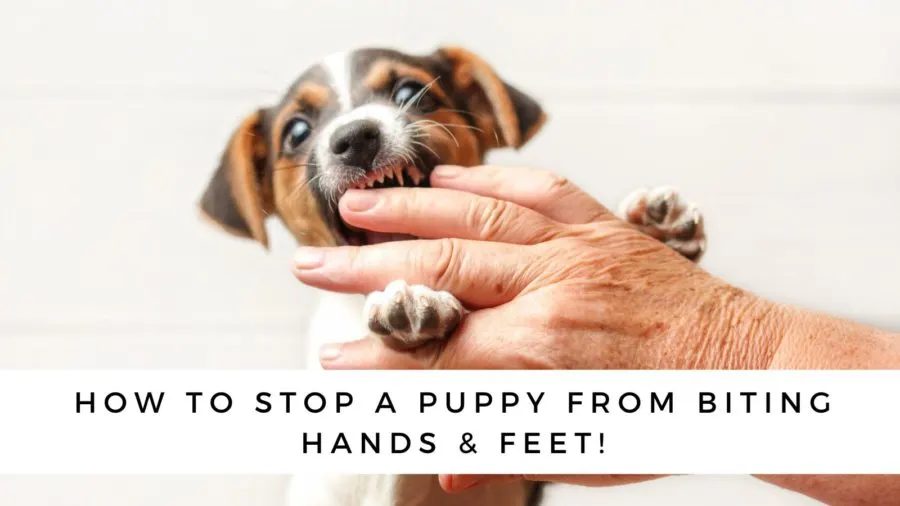
My Puppy Bites Hands!
My Boston Terrier is 3 months old; any trainer tips on how to stop a puppy from biting hands and feet?
Puppies are built to learn, explore and play with their mouths. While in a litter, play is very important in teaching puppies to develop what trainers call a soft mouth or bite inhibition.
If you watch puppies play, they will teach each other how to use their mouths appropriately.
During wrestlefests, you might hear one pup squeal and end the play session. He simply walks away from the other pup who just took it a bit too far.
This information is important.
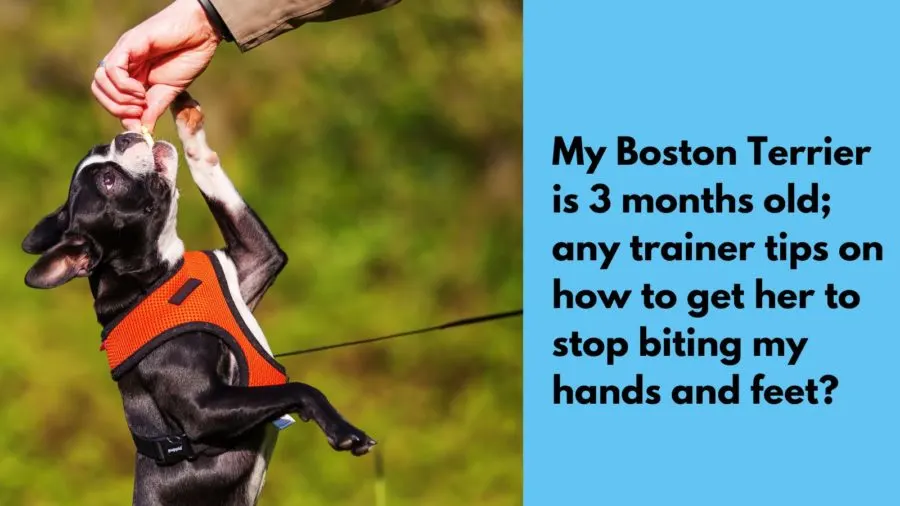
The overly excited puppy just learned that if he gets doesn’t control his mouth, he loses access to his sibling and the fun. Dogs are social creatures and getting along cohesively with others is innately wired (but also must be developed and maintained).
Gradually, the more a puppy plays with other littermates he learns to control his mouth.
Because we take our pups from their litter to help them in acclimating to life with us in a domestic setting (where we don’t use our mouth to play), we take away that natural bite inhibition development opportunity.
So, it rests upon us to pick up where the littermates left off!
As mentioned, pups are very social little creatures with a strong desire to play and interact with you. We are going to use that to teach your pup what is appropriate when spending time with you.
At this young age, your puppy should be on leash with a flat buckle collar or harness when interacting with you. This will help you control the situation.
Praise your puppy
Always praise your puppy with a friendly, but relatively calm voice for appropriate behavior such as:
- allowing you to pet him
- sitting peacefully in your lap
- playing with a chew toy
What to do when your puppy bites
When your puppy nips at you, your pants or skin, simply hold the leash away from your body and “turn off.” No eye contact, or words, just completely shut down.
After a 5-10 seconds resume interacting with him. You can also loop your pup’s leash to a door know a walk away a few steps.
Repeat as necessary. Like any other learned behavior, repetition is necessary for your dog to make the connection, “I nip him and he stops playing with me.”
The “time out” should be short, as you need to be sure pup is making a connection between the behavior (nipping) and the consequence (losing access to you). If left too long….well, puppy brain…
Don’t give your dog attention for inappropriate behavior.
It is very important that you are NOT inadvertently giving the pup attention for inappropriate behavior.
Often people make the mistake, of saying, “No! Bad puppy! Uh huh! Stop it!”
Puppies not understanding English, just view this as more attention and it actually reinforces the behavior.
If you really feel the need to say something, a calm “too bad,” (or your own phrase) stated just once right before you shut off is best.
Never grab your puppy’s mouth.
It is also important that you never grab your pup’s mouth closed or tap him on the nose in an attempt to stop nipping behavior.
First, you never want your puppy to question hands coming toward him. This only sets up fear and the possibility of a puppy that also runs from hands that reach at him.
Some very gregarious pups also just become more excited by this type of contact and it just escalates the situation.
Taking a small break, remaining calm, and remembering that your pup is simply just trying to learn are the ways to get through this phase.
My Dog Bites My Feet!
My 1-year-old Pomeranian likes to bite my feet as I walk. He’s just playing but it is annoying and it hurts. How can I make him stop?
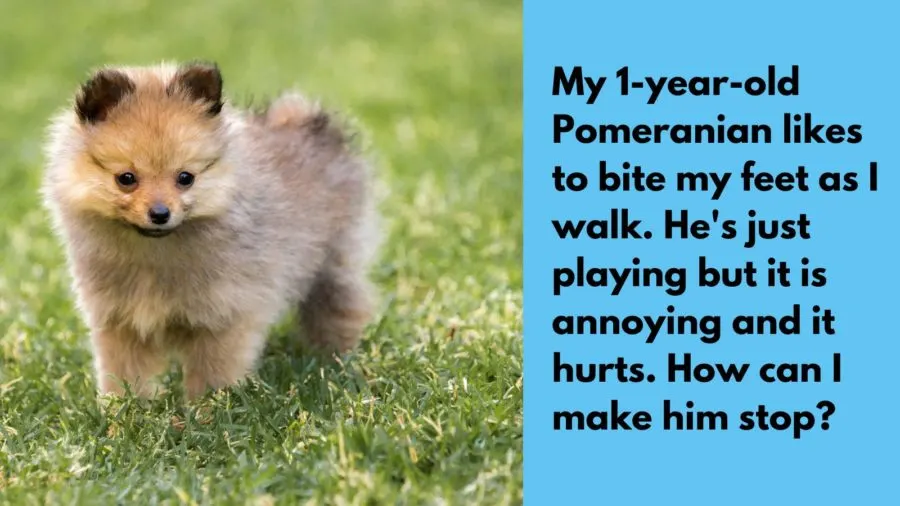
That was an easy visual to create. A little Pom doing the happy dance; barking, play growling and engaging a mock battle with those socks and feet. While admittedly entertaining to envision, “OUCH” for the unwilling participant.
Your Pom needs an understanding of appropriate play behavior.
This is both play and attention seeking behavior.
Stop your Pom before he starts!
The key to modern dog training is preventing undesired behaviors from being practiced while teaching our dogs what we expect of them in specific situations.
So, you need to be a step ahead of your Pom (not physically, but mentally).
You now likely can predict when this behavior is going to happen and or see the wheels start spinning in your little nutter. This is a good thing and something to use to your advantage.
Train or ask for a replacement behavior.
Think about what you’d like your dog to be doing instead. I’d say trotting nicely next to you, offering a sit or engaging with legal chew toys.
Again, before your dog launches his mock attack on your feet, ask that he offer a nice sit and reinforce the behavior lavishly.
Every few steps, walk, request a sit and reward. Your dog will soon learn that looking up at you and waiting for your request pays off!
Buy your dog appropriate play outlets.
Buy your dog appropriate play outlets and offer those to him BEFORE he starts seam ripping your socks. Meaning, when you get up to walk, toss a toy for him to carry.
When he chases and grabs it; praise him with “good toy” and even tug a bit on it with him.
Are you getting the theme here? PREVENT the behavior by predicting it and teach your pup new and legal behaviors!
Warm Wags,
Colleen
Related posts
- Chihuahua Barking? 3 Steps to Help Your Dog!
- Ask the Trainer: I’m Worried About My Dog & Kids
- Ask the Trainer: Dealing with Thunderstorms
About the Author
New York Walk & Train owner Colleen Safford, named “Best of NY” by New York magazine, answers questions from DogTipper readers about dog behavior and training.
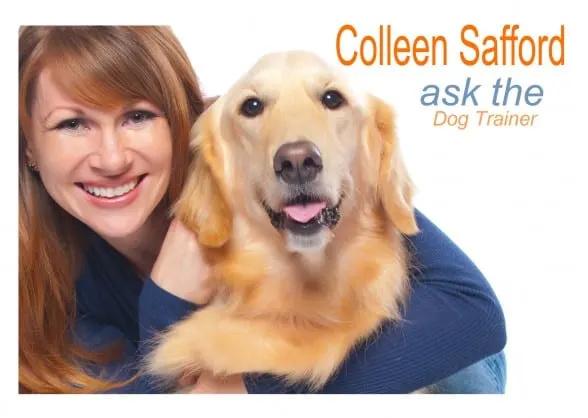
Pin it to remember
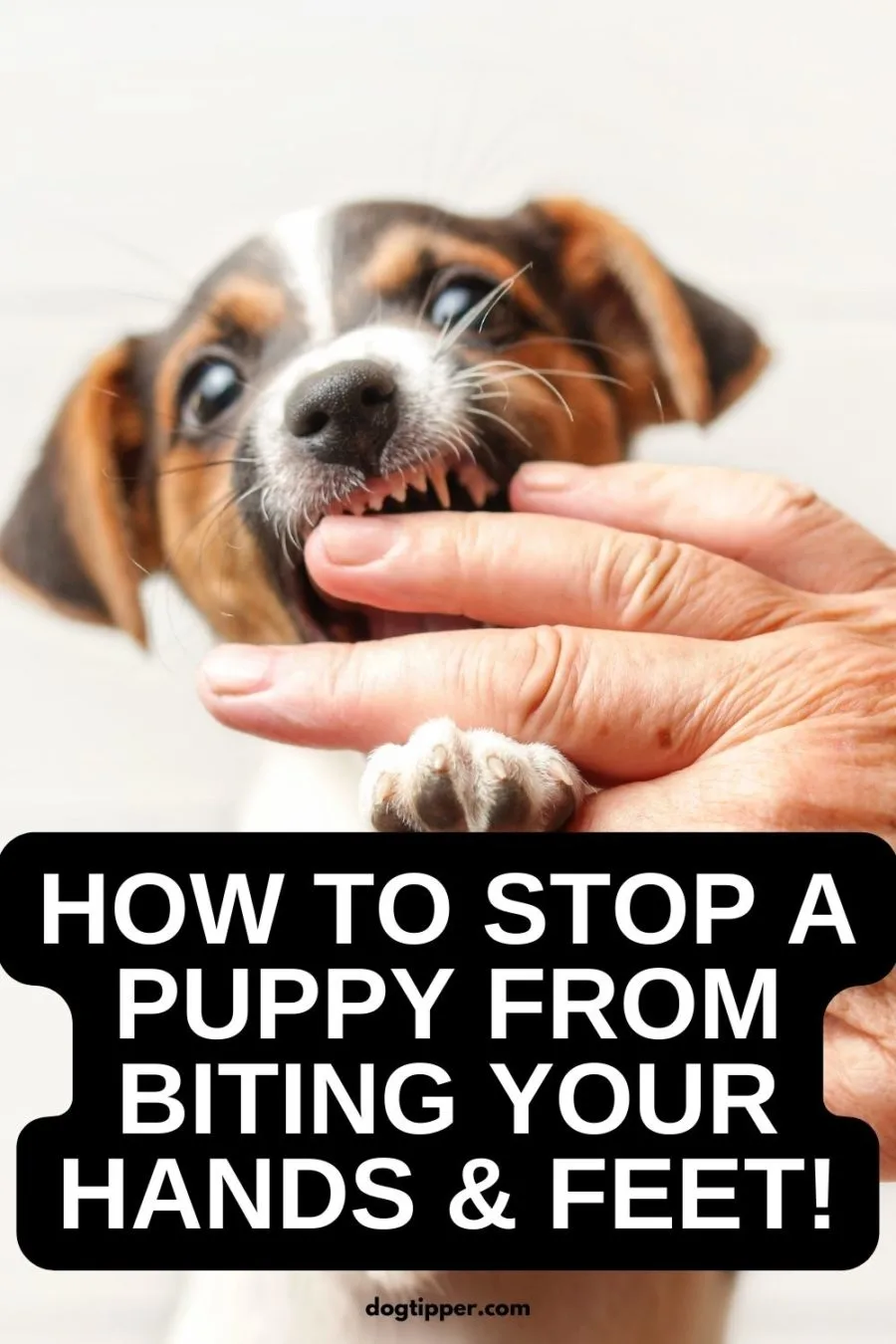
- Review: Jimmy BX7 Pro Anti-Mite Vacuum Cleaner - December 16, 2024
- 🎉 GIVEAWAY: Lord of the Pets Portrait of Your Dog! - November 26, 2024
- Review: Lord of the Pets Portraits - November 17, 2024
